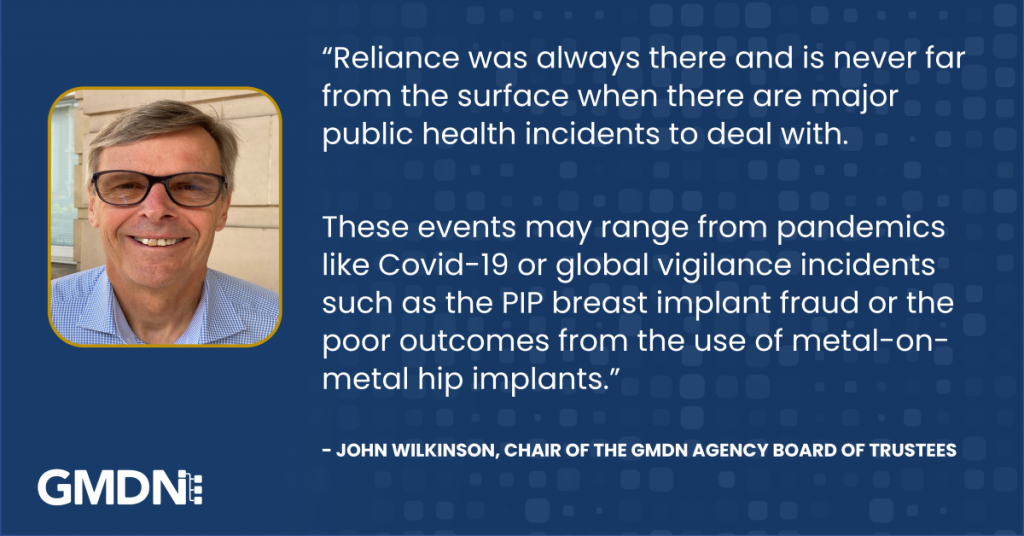Blog - Reliance: How not if

19 March 2024
Blog
Reliance – How not if
by John Wilkinson, OBE, Chair of the GMDN Agency Board of Trustees
I was delighted to see a major focus on ‘reliance’ at last week’s International Medical Device Regulators Forum (IMDRF) meeting hosted by the US FDA in Washington DC.
Reliance is the process whereby medical device regulators recognise and trust each other’s activities to be more efficient and effective. Avoiding duplication of effort is in everyone’s interest as it saves both governments and the medical device industry time and money.
Reliance was always there and is never far from the surface when there are major public health incidents to deal with. These events may range from pandemics like Covid-19 or global vigilance incidents such as the PIP breast implant fraud or the poor outcomes from the use of metal-on-metal hip implants. In cases such as these, it is vital that authorities around the world collaborate and share data to ensure that the incident is dealt with in a timely and consistent manner. Lack of collaboration and trust leads to duplication and often inconsistent and unhelpful advice to those on the front-line dealing with the situation.
Reliance, of course, goes much further in the routine work of regulators where regulatory submissions, assessment processes and content can all be harmonised so saving all involved time and resources. In addition, there is a fundamental equity issue as well. Why should patients and users in one jurisdiction be exposed to differing standards than those in another?
Underpinning reliance is the need for global standards. These can be process or data oriented. The increasing focus around the application of ISO 13485 is an example of the former whilst Global Medical Device Nomenclature (GMDN) Coding is an example of the latter.
If data exchange on the performance of medical devices is to be effective it is essential that a set of data standards underpins the collection and analysis of data in different jurisdictions. A good solid platform of data standards helps to ensure that pooled data is comparing eggs with eggs. Rapid consolidation and analysis of vigilance information between jurisdictions is key to early decision making and effective action. This can work both in the domain of medical devices causing harm as well as helping to confirm the value of innovation and accelerating adoption. In both cases the interest of patients is central. Early removal of failing devices prevents morbidity and mortality caused by delayed evidence and decision making. Early adoption of successful interventions similarly prevents morbidity and saves lives.
Global standards like GMDN are small but vital elements of a health data ecosystem that will allow the benefits of machine learning and in-silico modelling to accrue to patients across the world. This data can enable a new injection of continuous improvement in outcomes to be delivered. One small but significant project in this domain has just been funded in the UK. It has two goals:
· To improve safety by early detection of safety signals
· To enable a shift in the performance and safety data needed from pre-market to post market
GMDN is contributing to this project as am I personally. Its results should be of interest to the whole medical devices regulatory community.
Recent Posts
- GMDN FOCUS – September 2024 September 25, 2024
- Blog – The Importance of a Universal Definition for Medical Devices September 4, 2024
- GMDN Agency publishes white paper on the future of medical device nomenclature August 29, 2024
- Guest Blog – National Wound Care Strategy Programme: Enhancing Consistency with GMDN for Wound Management Products August 21, 2024
- GMDN FOCUS – Summer 2024 August 14, 2024
Working Hours
(Mon–Fri, 10:00-15:00 UTC)
